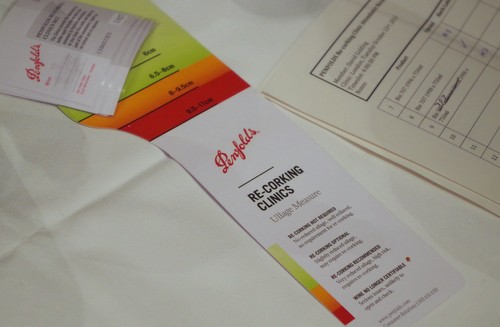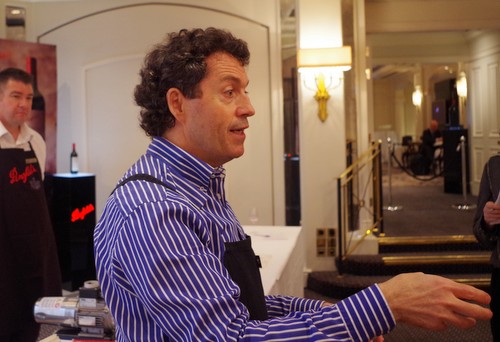Since 1991, celebrated Australian producer Penfolds have been running a series of recorking clinics for owners of bottles of their wines that are over 15 years old. ‘We’ve recorked/certified over 120 000 bottles,’ says chief winemaker Peter Gago, who was hosting this London event, the first to be held here since 2008.

It’s quite simple. If you have an old Penfolds bottle (or, indeed, a cellar full), then make an appointment, and rock up, and one of the Penfolds winemakers (they have used teams of as many of 12, such is the demand in some locations) will assess your bottles, and, if necessary, recork and certify them.
‘We won’t touch the bottles in good condition,’ says Gago, who has devised a template that can be used as a guide for how to proceed. ‘Years ago we’d spend 20 minutes arguing with a client whether we will recork or not.’
If the fill is too low, they won’t recork; if it’s too high they won’t either, because the wine is likely to be in good condition. They will only ever recork the same bottle once, and the wine is topped up with the current release wine, which for Grange this year was the celebrated 2008 vintage. The extra wine added is never more than 15 ml, which is 2% of the bottle. Gago says that in triangular tasting tests, you can’t spot the difference with this little wine added. If the ullage is too low, then the wine is likely to be in bad condition and too much wine would be required for topping up, changing the nature of the bottle.
If the fill is the appropriate level, the wine is carefully opened, and a small portion tasted. If it is typical and in good condition, then topping up proceeds, followed by recorking and the addition of a new capsule. Rather than this being a green light for counterfeiters, records are kept of wines coming through the recorking clinic, with a special numbered label attached to the back of the bottle. This acts as an authentication step: the wine is more traceable now than it was previously, and if anything, the auction value is increased. As fakes become more of an issue on the secondary market, this sort of authentication will become more valued.
If the wine isn’t good enough, it gets a white dot. It is recorked with a plain cork, and not certified – the owner is advised to take it home and drink it soon. It might still be a decent drink; it just doesn’t meet the standards for authentication.
‘You almost need to get into a bit of therapy and counselling,’ says Gago. ‘The level is down, the chances aren’t looking too good. For example, the 1962 Bin 60A is A$4500; if they brought in a 1951 Grange, it’s over A$50 000 a bottle. You are looking at a car one minute, an old crusty bottle the next. So there’s a little bit of pressure, a bit of emotion.’
It’s really interesting to see the process in action. For Penfolds, this is an expensive commitment, but it is also extremely clever marketing, and a good way to engage with customers who are now spending a lot of money on these wines.
‘Now we are not giving the wines an extra 30–40 years’ life,’ says Gago. ‘What we are doing is we are arresting deterioration because of leakage and seepage and saturation of the cork. We are not resurrecting it and giving it something it never had in the first place.’
In total, 230 bottles were recorked at the London event, including a rare 1956 St Henri and a 1959 Grange. ‘We’ve been running these clinics around the world for over 20 years and the experience is as fresh as it was back in the beginning,’ says Gago. ‘It’s all about people, humanity, emotion and wine.’
Here’s a film of the event, with Peter Gago taking us through the process.



I don’t real see the point of a recorking clinic.
Lets say I have an unopened bottle of Penfolds, it can be one of three states.
1. Good condition and doing well.
2. Poor condition and going down hill
3. Corked.
When it opened I discovered which one it is.
If it was good, it’s excellent news but it was already good, so nothing gained. The put in a new cork and so now my good wine has a slight risk of TCA
If it was poor they tell me it’s poor and I drink it soon there after. Again it would have been poor when I opened it so nothing changed except I can no longer sell it a auction.
If its corked its still corked and nothing changed.
Yes I guess it nice to meet the Penfolds team and you get a sneak peak at you wine, but not much else from the whole exercise.
They only benefit I can see is if you have a corked Grange you get the latest one as a replacement without the fuss of going back to the retailer. That’s assuming they replace corked wines on the spot.
Jamie, did they replace corked wines during the day or do something else.
The point is the marketing that Penfold develops doing this, plus the relationship building with their customers. Does it make sense?
Tony this is Penfolds’ response:
“One of the major benefits of attending a re-corking clinic (apart from spending some one-on-one time with a Penfolds winemaker asking as many questions as you like) is that owners get the rare opportunity to taste their wines at various stages of maturity with no detriment to their full cellaring potential. For many attendees this is a complete revelation and a highlight of the clinic.
Wines that are found to be affected by cork taint are replaced on the spot if the suitable replacement wine is available, or arrangements are made to get a replacement wine to the owner shortly after the clinic.”
Tony, I’d highlight the fact that just because a wine is in “good condition and doing well”, does not mean that it won’t benefit from a recorking.
I’ve, as i’m sure you have, enjoyed many pristine, highish-fill old wines, that, once the capsule is removed, appear doomed. The cork appears mouldy, rancid and barely capable of sustaining another week’s cellaring, let alone further years. And once this greasy, easily-removed cork is extracted, the wine appears miraculously preserved. I think these are the cases that Penfolds are addressing. Where the cork has reached the end of it’s useful life (20, 30, 40 years?) and desperately needs replacement.
I’d also point out that many august French chateaux conduct this same practice, but would never dream of offering it to the public. It is also free.
Say what you want about Penfolds price rises, but the recorking clinic is undisputably one of the great services to wine lovers.
Hi Jamie,
thanks for that very interesting article. Whether it is just a marketing event or some kind of tasting of cellar wines, it’s a great opportunity to get in touch with one of the most interesting wine makers around… And the wines will benefit, too!
Regards,
Christoph
Penfolds one of the best wineries.